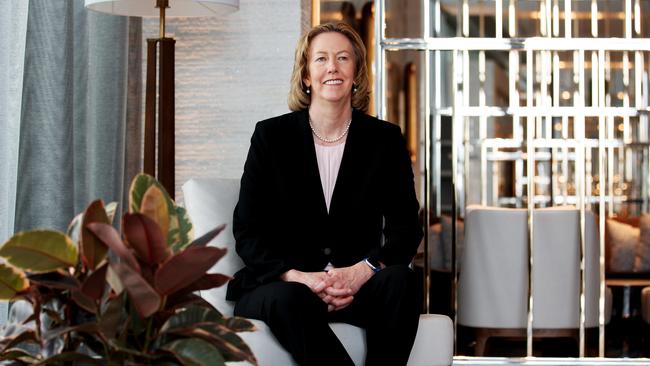Woodside’s Meg O’Neill says energy users face “tremendous uncertainty” over future gas prices
Woodside’s Meg O’Neill says energy users face “tremendous uncertainty” over future gas prices as the industry prepares for new ‘reasonable pricing’ rules.

Woodside chief executive Meg O’Neill says Australian energy users continue to face “tremendous uncertainty” over future gas prices as the details behind the federal government’s controversial reasonable pricing rules are thrashed out between industry and government.
Forming part of the gas industry’s new mandatory code of conduct, the reasonable pricing provision has been designed to ensure gas contracts are struck at prices that reflect production costs plus a margin allowing for a ‘reasonable’ rate of return.
Gas producers have criticised the policy, arguing that it ignores exploration and development risks and other significant expenses, and creates more uncertainty for investors in new projects.
It is due to come into force once the federal government’s temporary price cap on gas prices expires at the end of the year.
But Ms O’Neill told The Australian there was still uncertainty on how that transition between policies would impact producers and the prices they can charge customers.
“It’s very hard to forecast,” she said.
“Woodside signed the voluntary code of conduct, which APPEA (Australian Petroleum Production & Exploration Association) developed in very close consultation with the ACCC and the government last year.
“We went through a very extensive marketing effort to sell gas for 2024 to 2026.
“The regulation that imposes now a mandatory code of conduct with this reasonable pricing provision creates tremendous uncertainty over all of those future gas contracts.
“So it really is still a question mark about what might happen at the end of the year.”
Ms O’Neill said Woodside, Australia’s largest oil & gas company, was working with the government on its reforms in a bid to create more certainty in the market, which would in turn stimulate investment in new gas projects - which she said, was the best way to bring down prices in the long term.
“We have been engaging and working very closely with governments on a way forward,” she said.
“We’re trying to articulate the case for why more gas supply is the answer, and how we can have a framework that allows us to bring gas forward without the uncertainty that’s been created by this mandatory code with the reasonable pricing provision.”
Ms O’Neill’s comments followed a National Press Club address on Wednesday, in which she warned foreign investors were questioning whether Australia was a safe investment destination amid the changing regulatory environment.
She also urged the federal government to avoid slugging gas producers at next month’s budget, amid growing speculation Treasurer Jim Chalmers will announce a hefty tax hike through a potential overhaul of the petroleum resource rent tax (PRRT).
On Thursday APPEA, which Ms O’Neill chairs, released figures showing Australia’s oil & gas companies are on track to deliver a windfall $16.27bn in taxes, excise and royalties to federal and state governments in 2022-23, including $1.85bn under the PRRT, and up from $6.47bn in the previous financial year.
On Friday, speaking after the release of Woodside’s first quarter results, Ms O’Neill told The Australian the PRRT was working as intended, and oil & gas company’s were contributing their fair share to the broader economy.
“It is a super profits tax - it is working,” she said.
“Woodside, as a company, we paid $720m in PRRT in 2022. If you went back to 2020 we had a very significant loss as a company, a $5bn loss. Of course, we didn’t pay as much PRRT then, but when conditions are good we do pay our fair way.
“So I think the message should be pretty clear - when the industry does well, the Australian government and the Australian people do well. We need to have this stability to enable us to continue to invest and to do that for decades to come.”
Woodside’s quarterly production fell 9 per cent to 46.8 million barrels of oil equivalent (MMboe) in the March quarter, due to turnaround and maintenance activities.
However the company said full-year production guidance remained unchanged.
Production was 122 per cent higher than the first quarter of 2022, reflecting the impact of the merger with BHP’s petroleum business last June.
Revenue for the quarter came in at $4.33bn, down 16 per cent from the December quarter due to lower production and lower realised prices.
Woodside’s average selling price during the quarter was $85 a barrel, down from $98 in December.
Ms O’Neill said the outlook for oil prices would largely depend on how recessionary pressures in the US and China’s economic recovery would affect global demand.
Woodside said its Scarborough and Pluto Train 2 LNG projects in Western Australia were now 30 per cent complete and on track to deliver a first LNG cargo in 2026.
However in a note to clients, Citi analysts warned there were ongoing risks at Scarborough.
“Growth projects seem to be ticking along to schedule, particularly Scarborough, albeit the floating production unit which is critical path has only commenced construction so the riskiest aspects of delivery are still ahead,” the note says.
“We remain cautious until proven otherwise on Scarborough, notably with respect to secondary approvals, and continue to believe the market has more work to do on pricing some risk to execution.”
Citi is factoring in a six-month delay to first production at Scarborough.



To join the conversation, please log in. Don't have an account? Register
Join the conversation, you are commenting as Logout